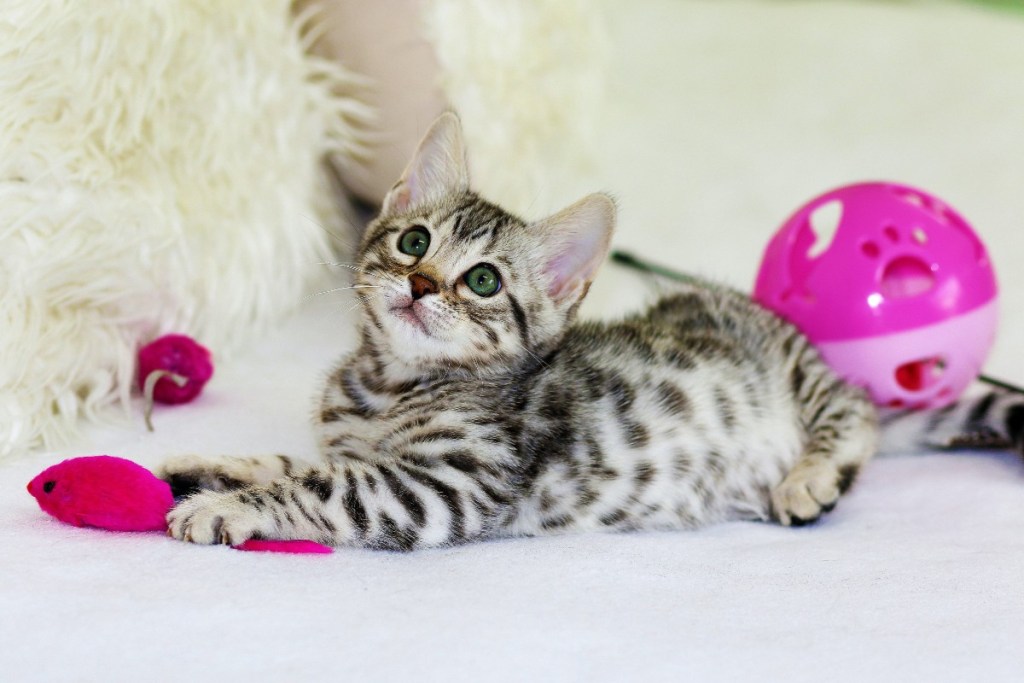Simply thinking about your new kitten probably makes you smile. You just recently bought your little furball home, but you already can’t imagine your life without them. You’ve loved introducing them to every inch of your house, and your snuggle sessions are true highlights. You might wonder if the feeling is mutual if your kitten is crying. It’s so tough to hear your little one in distress.
Why do kittens cry? There are several reasons. Pinpointing what’s triggering your little one can help you effectively soothe them.

Why do kittens cry?
Every kitten is unique. Some pets seamlessly transition to their new home but may have different reasons for crying, while others need time to adjust. Also, a kitten may cry multiple times per day for various reasons. Here are common explanations for kitten crying, according to experts.
Your kitten is experiencing new-home stress
You tried your best to make your home as comfortable as possible for your kitten with a cozy bed, toys, and a scratching post. Despite your best efforts, your kitten might be feeling some anxiety about their new home, which experts say this is normal. Think about it: You might have missed your home on your first night at sleep-away camp or if you went away to college. Your tiny kitten is no different.
They’re hungry
When a kitten is nursing, they let mom know they’re hungry by meowing, just like a human baby does. You are now your kitten’s parent, so they may be signaling you that they need to eat.
They’re cold
Kittens also cry to their mother when they are cold. Your kitty may be alerting you that they’re not a fan of having the air conditioning on full-blast.
Your kitten can’t find something important
Part of adjusting to a new home is learning the lay of the land, including where your kitten can find their food, water, bed, and toys. A kitty may become upset if they can’t find something they want or need.
They’re not feeling well
Excessive meowing may be a sign your kitten is not feeling well. The crying often accompanies other symptoms, such as reduced appetite or fatigue.
They’re teething
Kittens begin losing their baby teeth around four months old and will typically have all 30 of their adult (permanent) teeth by 6 or 7 months old. Teething is about as fun for some kittens as it is for human babies. The process may involve some kitty cries.

How to comfort your crying cat
When your kitten is crying, you want to do everything you can to help. Once you know what’s triggering the sad-sounding meows, you can try some of these expert-backed ideas.
Plenty of play sessions
Playing with your kitten can alleviate stress and help them sleep more soundly. More importantly, playtime is a bonding experience. The more comfortable your kitten becomes with you, the less anxiety they’ll feel in their forever home.
Make sure kitty’s necessities are easily accessible
Pick one spot for items like the litter box and food and water dishes and keep them there. Make sure these items are in places that don’t require much effort to access — high shelves or hidden corners of the house are no-gos. Try places that are out in the open, so your kitty can easily find them.
Invest in chew toys
Toys are not only fun, they can reduce teething pain. Give your kitty rubber or plastic toys for about 15 minutes twice per day during teething.
Check your kitten’s dishes
There’s a chance your kitten needs food and water. Take a peek at their dishes to see if they are empty and refill them if need be. Follow your vet’s guidelines for how much food you should be feeding them per day.
Get a larger litter box
As your kitten grows, they may need more space in their litter box. They often need a larger one between 9 and 16 weeks, and it’s a good idea to evaluate it for the first year.
Call the vet
If none of these tips seem to be working or your cat is displaying symptoms of illness, including GI issues, vomiting, excessive meowing, and tiredness, you’ll want to give the vet a call. They can check to make sure there isn’t a medical issue that needs treating.
Figure out the root cause of crying
It’s sad to hear your kitten cry, and it’s natural to want to fix it ASAP. The first step is figuring out why your kitten is crying. There are several possible reasons, including stress, coldness, hunger, or illness. Once you determine what’s triggering the crying, you can help your kitty feel better. Playing with them is one way to keep them happy and bond with them. When your cat is teething, have chew toys available to help relieve pain. You’ll want to ensure your cat’s food and water bowls are easy to find and full and that their litter box is the right size for their growing body. Call your vet if you think your cat is sick or if you can’t figure out what’s up. They’ve seen it all and can help.



